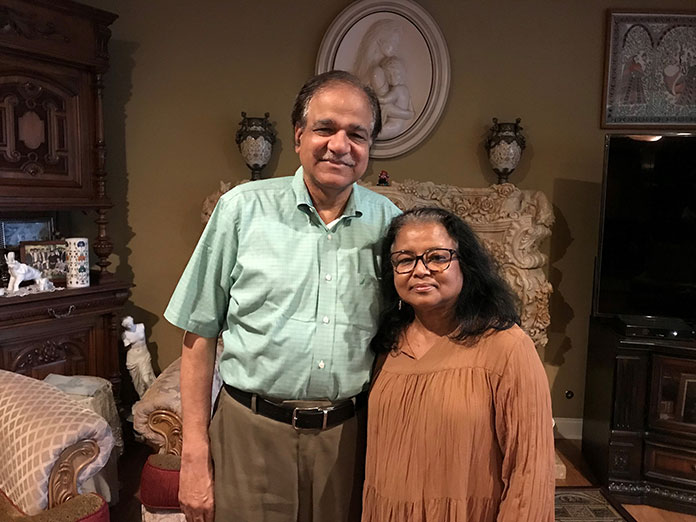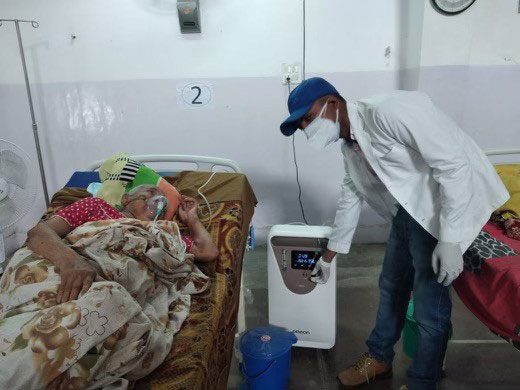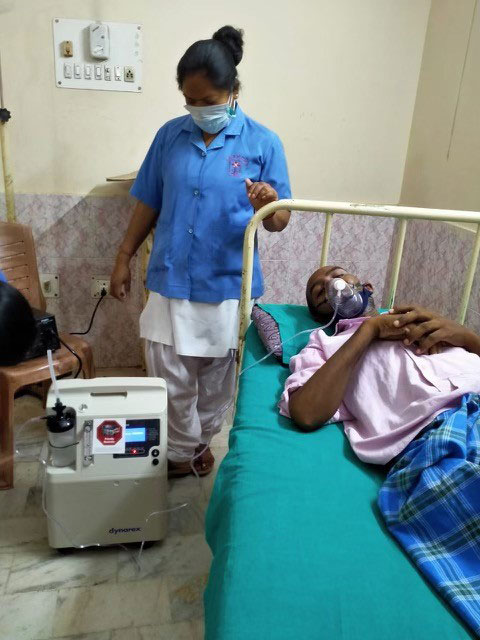
TOMS RIVER – Here in New Jersey, we are slowly crawling out from under the shadow of the pandemic, but it’s not the same everywhere. We faced the brunt of it last year, but now other states are feeling it. And other countries.
One thing this pandemic has proven is that it is hard for people to imagine what someone else is going through. How many times have you heard someone say that it’s the virus that big of a deal – until it happens to them or someone they love?
Locally, vaccination sites are no longer clogged. Most people who want a vaccine seem to be able to get them without a problem. So, two local doctors have turned their eyes toward those in need close to their roots.
Avinash and Geeta Gupta are Toms River doctors who have been helping people in their native India as well.
Geeta went to India in February of 2020 to start a free clinic with other doctors in the city of Ranchi. The clinic is called Bran, which means “life” in Hindi.
“We grew up there. We went to med school there, so that’s why we want to give back to our area,” she said.
It was still early in the pandemic timeline, and India didn’t have many cases. She wound up testing positive when she returned. She had a mild case, isolated for 10 days, and recuperated.
The first wave of coronavirus didn’t impact India as bad as here, which left people with a false sense of security. Now, less than 10 percent of the population is vaccinated.

“India is in the same situation this year as we were last year,” Avinash said. “We were getting calls every day: ‘We are not getting hospital beds. We can’t get oxygen. We can’t even get doctors.’”
Just as they started the free clinic last year, the Guptas started a COVID care center in Patna this year.
Telemedicine revolutionized treatment here, and abroad. What better way to avoid spreading the disease than not even being in the same room? Now, expand on that – why not treat people in another country the same way?
The Guptas have been doing telemedicine for people in India for months now. They dedicate at least an hour a day. At 9:30 p.m. here, it’s 7 a.m. there. There could be 250 people on the tipline, and it fills up immediately. They can break out into 1-on-1 consultations for privacy. Other doctors have joined their mission and also provide telemedicine. Blood reports and X-rays are shared through WhatsApp.
The patients they are seeing in India have the same issue here, and that’s vaccine hesitancy. Some patients don’t think they need it.
The doctors instruct patients on how not to contract the virus, how to treat it, and how to recover from it. The first part – preventing transmission – is the same mantras we have heard here: wash hands, social distance, get a vaccine.
The next step is evaluating how sick they are if they do test positive. Since there is a shortage of beds in hospitals, it’s important that only the worst cases go there. If the virus can be treated at home, they should stay at home. A patient’s blood oxygen level and temperature are taken, and if it’s within a safe range, they are told how to take care of themselves.
Finally, if someone has already beat the virus, there is quite a bit of aftercare needed, especially if it was a serious case. Something you don’t hear about too often is the lingering effects.
Additionally, the virus has claimed a large number of working men in India, leaving widows and children behind. It’s been heartbreaking, Geeta said. An organization they belong to, Bihar-Jharkhand Association of North America, has been sending aid in two different ways. First, there is immediate aid for people facing starvation, such as pregnant women. Second, they are trying to help the survivors learn skills to establish a livelihood for the long run.

“India is the largest producer of vaccines,” Avinash said. However, they distributed them all to other countries because it wasn’t so bad in their own country. Now that it is, there’s a shortage.
And when they needed help, it wasn’t coming from here. There was a shortage of ingredients coming from the U.S. Finally, President Joe Biden lifted the embargo, allowing the materials to be exported there.
While the vaccine isn’t a 100 percent surefire protection, it does weaken the virus if you do catch it. “It’s turning a deadly disease into the common cold,” Avinash said. It will likely prevent you from having to be hospitalized.
This is very important considering the Delta and Delta Plus variants that are now spreading, and are even more contagious.
How To Help
BJANA is a philanthropic organization that provides aid to disadvantaged people in the Indian states of Bihar and Jharkhand. Dr. Avinash Gupta is president of this organization. This group has been able to provide medical supplies, immediate aid, and even ambulances.
Visitors to BJANA.org can click on the Help BJANA drop-down menu in order to donate or volunteer.





